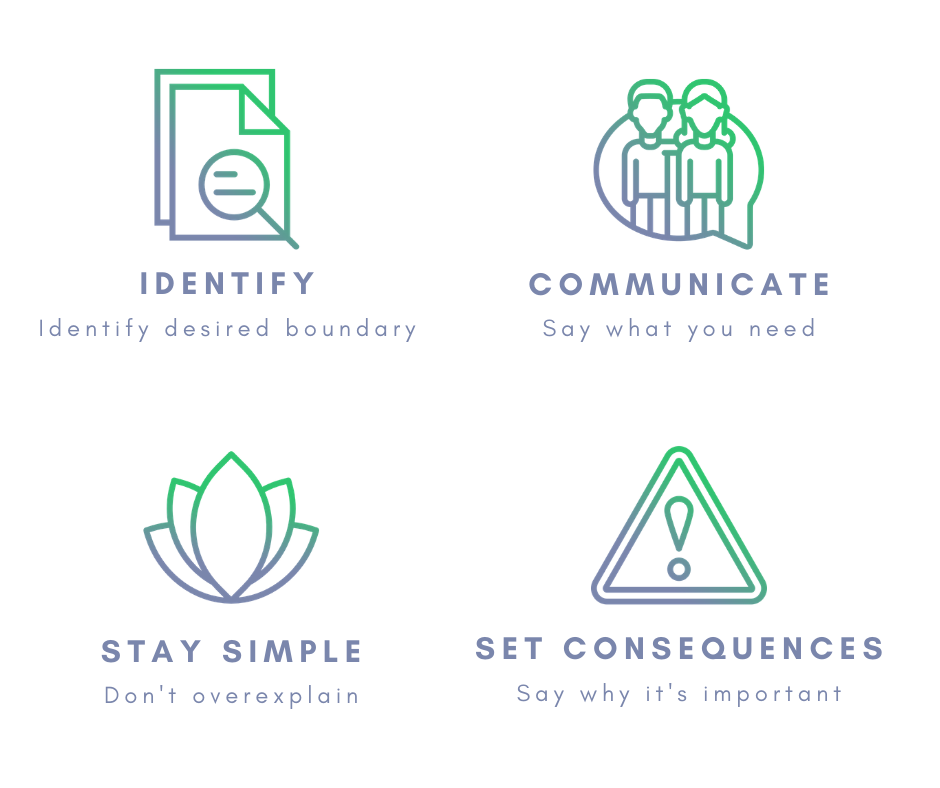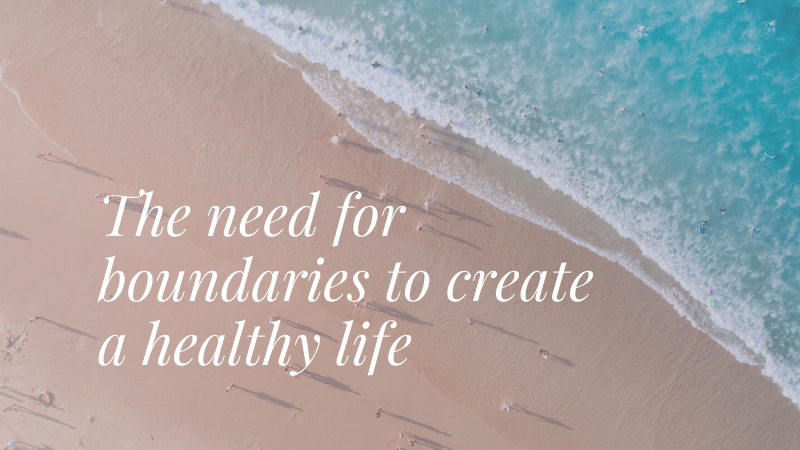Boundaries are crucial to healthy relationships and healthy life. Furthermore setting and maintaining boundaries is a skill. But unfortunately, it’s a skill that many of us don’t learn or have. Although, we might pick up pointers here and there from experience or through watching others. But for many of us, boundary-building is a relatively new concept and a challenging one.
Having healthy boundaries means
knowing and understanding what your limits are.
Boundaries and self-worth
Moreover, boundaries can be defined as the limits we set with other people, which specify what we find acceptable and unacceptable in their behavior towards us. However, the ability to know our boundaries generally comes from a healthy sense of self-worth or valuing yourself in a way that is not contingent on other people or the feelings they have toward you. Self-worth is finding an essential value in who you are so that you can be aware of your:
- Intellectual worth and boundaries (you are entitled to your own thoughts and opinions, as are others)
- Emotional worth and boundaries (you are entitled to your own feelings to a given situation, as are others)
- Physical worth and boundaries (you are entitled to your space, however wide it may be, as are others)
- Social worth and boundaries (you are entitled to your own friends and to pursuing your own social activities, as are others)
- Spiritual worth and boundaries (you are entitled to your own spiritual beliefs, as are others)
The flexibility of boundaries
However, it is important to note that boundaries should be flexible. So, don’t draw your boundaries in permanent ink. It’s good to think about them occasionally and reconsider. When boundaries are too rigid or inflexible, problems can occur. You don’t want to isolate yourself, avoid closeness altogether, or give up all your time to others. Every relationship that you have in your life is very individual and unique, so it’s normal that your boundaries will change and shift with each relationship.
In addition, knowing your boundaries and setting them are two very different obstacles to overcome. Because setting boundaries does not always come easily. It’s often a skill that needs to be learned. Much of human social learning comes from modeling behavior, so if you do not have adequate role models whose behavior you can encode through observation and later imitate, you are at a loss, often left groping and frustrated.
Your boundaries are shaped by
- your heritage or culture
- the region you live in or come from
- whether you’re introverted, extroverted, or somewhere in between
- your life experiences
- your family dynamics
Setting up boundaries as mentioned above is a skill that you can learn and develop. You can take over control of your life, and start to create your boundaries that are not limited to your life experience but boundaries that are more congruent with yourself. So here are a few examples of the steps that you can take to recreate your healthy boundaries:
Name your limits.
You can’t set good boundaries if you’re unsure of where you stand. So to identify your physical, emotional, mental, and spiritual limits. Also, consider what you can tolerate and accept and what makes you feel uncomfortable or stressed.
Be direct.
Sometimes, however, with some people, maintaining healthy boundaries doesn’t require a direct and clear-cut dialogue. Usually, this is the case when people are similar in their communication styles, views, personalities, and general approach to life. However, with others, such as those who have a different personality or cultural background, you’ll need to be more direct about your boundaries.
Give yourself permission.
Fear, guilt, and self-doubt are big potential downsides. You might fear the other person’s response if you set and enforce your boundaries. Or, you might feel guilty by speaking up or saying no to a family member. You even might wonder if you deserve to have boundaries in the first place. Boundaries aren’t just a sign of a healthy relationship; they’re a sign of self-respect. So give yourself permission to set boundaries and work to preserve them.
Consider your past and present.
Equally important, how you were raised along with your role in your family can become additional difficulties in setting and preserving boundaries. If you held the role of caretaker, you learned to focus on others and letting yourself be drained emotionally or physically. Moreover, ignoring your own needs might have become the norm for you. Again, this is where tuning into your feelings and needs, and honoring them becomes critical.
Make self-care a priority.
Make self- care a priority, which also includes giving yourself permission to put yourself first. When you do this, your need and motivation to set boundaries to become stronger. Self- care also means recognizing the importance of your feelings and honoring them. These feelings serve as important cues about your wellbeing and about what makes you happy and unhappy.”
Seek support.
If you’re having a hard time with boundaries, seek some support, for example, support group, church, counseling, coaching, or good friends. With friends or family, you can even make it a priority with each other to practice setting boundaries together and hold each other responsible.
Be assertive.
Of course, you know that it’s not enough to create boundaries; you actually have to follow through. Even though you know intellectually that people are not mind readers, we still expect others to know what hurts us. Since they don’t, it’s important to assertively communicate with the other person when they’ve crossed a boundary. In a respectful way, let the other person know what in particular is bothersome to you and that you can work together to address it.

Boundaries allow you to conserve your emotional energy
Your self-esteem and identity can be impacted, and you build resentment toward others because of an inability to advocate for yourself. However, you don’t need to have the same boundaries or comfort level for everyone. Boundaries that let us have a different range depending on the situation or person can also help you maintain enough energy to care for yourself.
Understand that just because you may be happy to lend a hand to your best friend on moving day doesn’t mean you also have to do the heavy emotional lifting when someone texts about their latest drama.
Boundaries are to help you
You can really think of setting boundaries as invigorating your relationships with others rather than building walls to keep people out. But boundaries do another important thing for you.
They can clue you into behavior that might be harmful. Think about the front door of your home. If someone breaks it down, you know there’s a problem.
“Often, you push your instincts aside because you are convinced they are unreasonable, or you have been taught not to trust them. But if something feels consistently uncomfortable or unsafe, it is a red flag that abuse may be a problem.”
If someone is repeatedly pushing or violating your boundaries, listen to your gut.
And to avoid being the one doing the boundary-busting. Ask people in your life to be honest with you about if you are pushing any boundaries. This may feel scary, but it will most likely be met with appreciation and will mark you as a safe person to set boundaries with.
References:
Becker WJ, et al. (2018). Killing me softly:
Electronic communications monitoring and employee and spouse well-being. DOI:
10.5465/AMBPP.2018.121
Burke SC, et al. (2011). Using technology to control
intimate partners: An exploratory study of college undergraduates. DOI:
10.1016/j.chb.2010.12.010
Morin M. (2016). There is a clear line between
oversharing and being authentic – Here’s how to avoid crossing it.
forbes.com/sites/amymorin/2016/10/22/there-is-a-clear-line-between-oversharing-and-being-authentic-heres-how-to-avoid-crossing-it/#2a33f01d56e3

